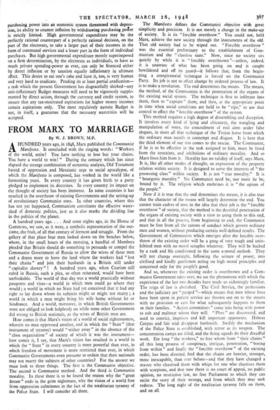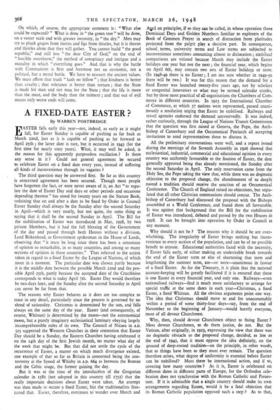FROM MARX TO MARRIAGE
By W. J. BROWN, M.P.
AHUNDRED years ago, in 1848, Marx published the Communist Manifesto. It concluded with the ringing words: "Workers of the world, unite! You have nothing to lose but your chains. You have a world to win! " During the century which has since elapsed the strange combination of economic analysis, Old Testament hatred of oppression and Messianic urge to social apocalypse, of which the Manifesto is composed, has worked in the world like a fermenting yeast. In every country it has given birth to a party pledged to implement its doctrines. In every country its impact on the thought of society has been immense. In some countries it has resulted in the overthrow of existing Governments and the setting-up of revolutionary Communist ones. In other countries, where this has not yet happened, Communism constitutes the effective water- shed of domestic politics, just as it also marks the dividing line in the politics of the planet.
A hundred years ago. . . . And some nights ago, in the House of Commons, we saw, as it were, a symbolic representation of the out- come, the fruit, of all that century of ferment and struggle. From the gallery of that place four men looked down on the benches below, where, in the small hours of the morning, a handful of Members pleaded that Britain should do something to persuade or compel the Communist Government of Russia to allow the wives of these men and a dozen more to leave the land where the workers had "lost their chains" and join their husbands in a Britain still under "capitalist slavery " ! A hundred years ago, when Czarism still ruled in Russia, such a plea, so often reiterated, would have been unthinkable. The world of that day was a world practically without passports and visas—a world in which men could go where they would ; a world in which no State had yet conceived that it had any right to lay down whom its subjects might or might not marry ; a world in which a man might bring his wife home without let or hindrance. And a world, moreover, in which British Governments were not obliged to look helplessly on while some other Government did wrong to British nationals, as the wives of British men are.
How comes it that Marx's vision of a world of social righteousness, wherein no man oppressed another, and in which the " State " (that instrument of tyranny) would "wither away" in the absence of the "class organisation" of society of which it was the instrument— how comes it, I say, that Marx's vision has resulted in a world in which the " State " in every country is more powerful than ever, in which freedom of movement is more restricted than ever, in which Communist Governments even presume to ordain that their nationals may not marry the subjects of other countries? For the answer we must look to three things. The first is the Communist objective. The second is Communist method. And the third is Communist morality. In these three is to be found the reason why the "great dream" ends in the grim nightmare, why the vision of a world free from oppression culminates in the fact of the totalitarian tyranny of the Police State. I will consider all three.
The Manifesto defines the Communist objective with great simplicity and precision. It is not merely a change in the make-up of society. It is its "forcible overthrow." You could not, held Marx, achieve the new society through the instruments of the old. That old society had to be wiped out. "Forcible overthrow" was the essential preliminary to the establishment of Com- munism and the "classless state." Now, since no society sits quietly by while it is "forcibly overthrown "—unless, indeed, it is unaware of what has been going. on and is caught bewildered and off its guard—it follows that, from the begin- ning a conspiratorial technique is forced on the Communist Party. Its job is not to effect change by ordered process of law. It is to make a revolution. The end determines the means. The means, the method, of the Communists is the penetration of the organs of the existing social system. The technique is first to infiltrate into them, then to " capture " them, and then, at the appropriate point in time when social conditions are held to be "ripe," to use that control to effect the "forcible overthrow" of the system.
This method requires a high degree of dissembling and deception. It involves every kind of lying and chicanery, the wangling and manipulation of votes, the concealment of real aims under false slogans, in short all that technique of the Trojan horse from which the ordinary man recoils in contempt and disgust. It is here that the third element of our trio comes to the rescue. The Communist, if he is to be effective in the task assigned to him, must be freed from the restraints, and inhibitions of ordinary morality. And so Marx frees him from it. Morality has no validity of itself, says Marx. It is, like all other modes of thought, an expression of the property relation within society. It is designed to serve the interests of "the possessing class" within society. It is not "true morality." It is "bourgeois morality." No Communist need be, nor must he be, bound by it. The religion which enshrines it is "the opium of the people."
Now if it is true that the end determines the means, it is also true that the character of the means will largely determine the end. You cannot train cadres of men in the idea that their job is the "forcible overthrow" of society, that the method is the deceitful penetration of the organs of existing societir with a view to using them to this end, and that in all the process, from beginning to end, the Communist must be free from all the canons of conduct which govern ordinary men and women, without producing certain well-defined results. The Government of Communists which emerges after the forcible over- throw of the existing order will be a gang of very tough and unin- hibited men with no moral scruples whatever. They will be backed by a rank and file conditioned to the same a-moral outlook. They will not change overnight, following the seizure of power, into civilised and kindly gentlemen acting on high moral principles and concerned only for the people's good.
And so, whenever the existing order is overthrown and a Com- munist Government takes over, we see the phenomena with which the experience of the last two decades have made us sickeningly familiar. The reign of law is abolished. The Civil Service, the professions and the judiciary are "purged "—which means that men whose lives have been spent in patient service are thrown out on to the streets with no provision or care for what subsequently happens to them or their families. "Action committees" come into being with power to rob and maltreat whom they will. " Plots " are discovered, and used to convict, imprison and kill important opponents. Habeas Corpus and fair trial disappear forthwith. Swiftly the mechanism of the Police State is established, with terror as its weapon. The concentration camps are filled, and the firing squads do their dreadful work. Ere long "the workers," to free whom from "their chains" all this long process of conspiracy, intrigue, penetration, "boring from within" and finally the "forcible overthrow" of the existing order, has been directed, find that the chains are heavier, stronger, more inescapable, than ever before—and that they have changed a master who chastised them with whips for one who chastises them with scorpions, and that now there is no court of appeal, no public opinion, no restrictive law, no free Parliament to which they can recite the story of their wrongs, and from which they may seek redress. The long night of the totalitarian tyranny falls on them, and on all.
On which, of course, the appropriate comment is: "What else could be expected?" What is done in "the green tree" will be done, on a vaster scale and with greater intensity, in "the dry." Men may try to pluck grapes from thorns and figs from thistles, but it is thorns and thistles alone that they will gather. You cannot build "the good republic," and still less "the dear City of God," on the end of "forcible overthrow," the method of conspiracy and intrigue and a morality in which "everything goes." And. that is why the battle with Communism is first and foremost not an economic, not a political, but a moral battle. We have to reassert the ancient values. We must affirm that truth " hath no fellow " ; that kindness is better than cruelty ; that tolerance is better than torture ; that the State is made for man and not man for the State ; that the life is more than the meat, and the body than the raiment ; and that out of evil means only worse ends will come.



































 Previous page
Previous page